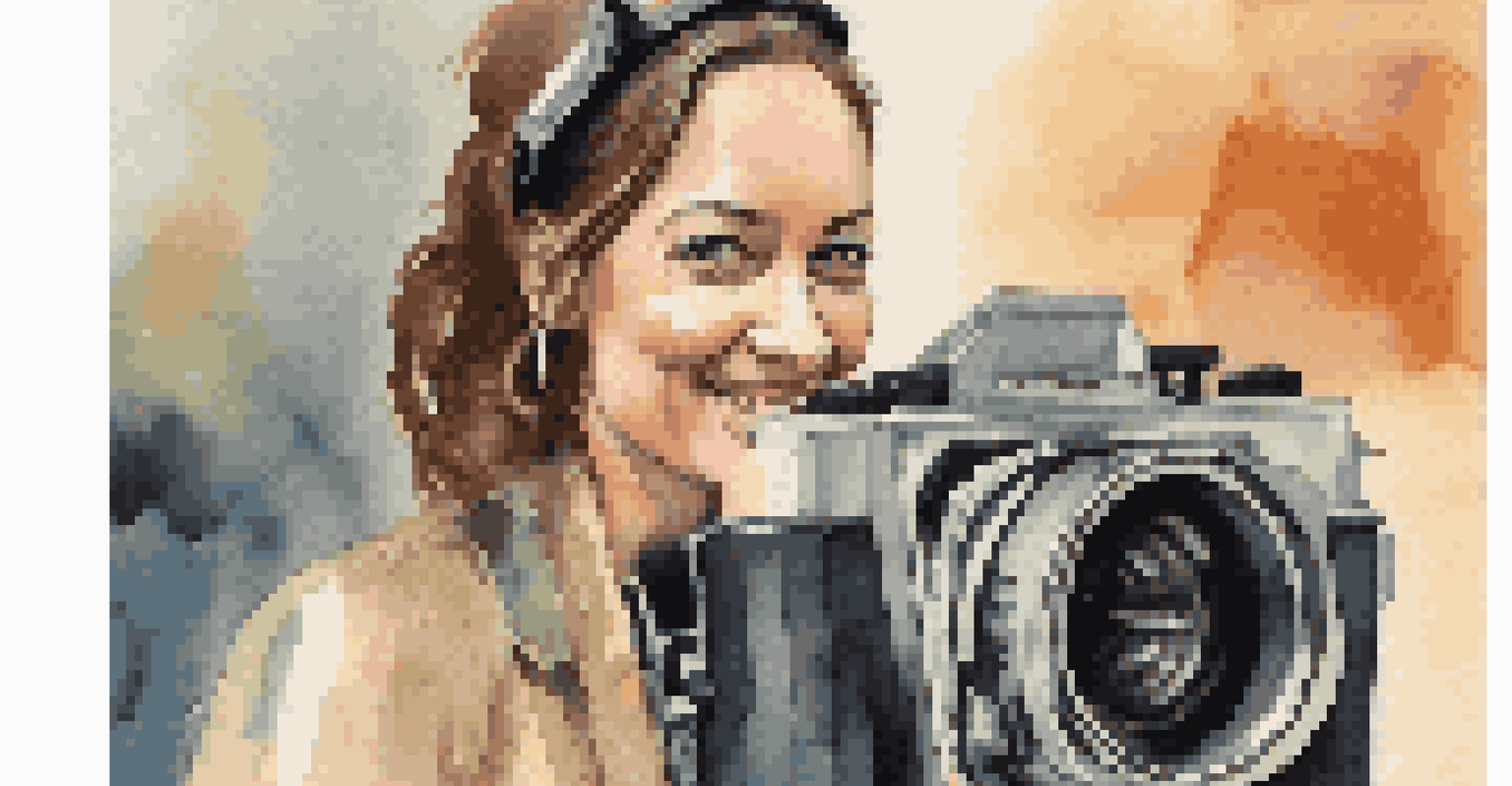Female Representation in Music Documentaries and Biopics

Understanding Female Representation in Music Media
Female representation in music documentaries and biopics has evolved significantly over the years. Historically, many films focused primarily on male musicians, often sidelining the contributions of female artists. However, as societal norms shift, there’s a growing recognition of the need to highlight women's stories within the music industry.
Women have been essential to the music industry, yet their contributions are often overlooked. It’s time for their stories to be told.
This evolution is not just about increasing numbers; it’s about portraying the rich and diverse narratives that female musicians bring to the table. By showcasing their struggles, triumphs, and artistry, these films provide a more rounded view of music history. For instance, documentaries like '20 Feet from Stardom' shed light on the often-overlooked backup singers, many of whom are women who played crucial roles in shaping iconic sounds.
As audiences become more aware and demanding of representation, filmmakers are now tasked with the responsibility of presenting a balanced narrative. This shift not only enriches the viewer's experience but also serves to inspire future generations of female musicians.
The Impact of Documentaries on Female Artists' Visibility
Documentaries and biopics serve as powerful tools for elevating female artists' visibility. By documenting their journeys, these films help to celebrate the artistry and hard work that is often overlooked in a male-dominated industry. They create platforms for women to share their stories and connect with a broader audience.

For example, the biopic 'La Vie en Rose' about Edith Piaf not only brought her music back into the spotlight but also introduced her life story to new generations. This kind of representation can lead to increased appreciation for the artist’s work and inspire a renewed interest in their music. It also prompts discussions about the challenges women face in the industry, such as sexism and gender bias.
Evolving Female Representation
There’s a growing recognition of the need to highlight women's stories within the music industry through documentaries and biopics.
Moreover, these documentaries can serve as a catalyst for change by highlighting the importance of equal representation. When audiences see the struggles and successes of female musicians, it encourages a more inclusive view of the music landscape.
Challenges in Representing Female Musicians
While progress has been made, there are still significant challenges in representing female musicians accurately and fairly. One major issue is the tendency to focus on sensational aspects of their lives rather than their musical achievements. This can lead to a distorted image that overshadows their talent.
The future belongs to those who believe in the beauty of their dreams. Women in music need to see their dreams reflected in the stories that are told.
Documentaries may also fall into the trap of emphasizing relationships with male figures, which can detract from the women's individual contributions to music. For instance, exploring the life of a female artist often includes significant portions dedicated to their romantic relationships, rather than their creative processes or professional milestones.
This challenge highlights the importance of storytelling in music documentaries. By shifting the focus back to the artists' careers and achievements, filmmakers can create a more authentic portrayal that honors their contributions to the industry.
Celebrating Diverse Female Musical Voices
Another crucial aspect of female representation in music documentaries is the celebration of diverse musical voices. Women in genres such as hip-hop, country, rock, and classical each have unique stories that deserve to be told. Highlighting these diverse narratives enriches the overall understanding of music culture.
For example, documentaries like 'Miss Sharon Jones!' not only showcase the talent of Sharon Jones but also explore her journey as a woman of color in the music industry. This adds layers to her story, allowing audiences to appreciate the intersectionality of race, gender, and music.
Impact of Documentaries
Documentaries and biopics elevate female artists' visibility, celebrating their artistry and addressing challenges like sexism in the industry.
By embracing diversity, filmmakers can create a more inclusive narrative that resonates with a wider audience. This approach not only reflects the reality of the music industry but also inspires future female artists from all backgrounds.
The Role of Female Filmmakers in Music Documentaries
Female filmmakers play a pivotal role in shaping the narrative of music documentaries focused on women. Their unique perspectives allow them to tell stories that resonate on a deeper level, often highlighting issues that male filmmakers might overlook. This can lead to more authentic portrayals of female musicians and their experiences.
Films like 'A Seat at the Table,' directed by a female filmmaker, emphasize the importance of representation behind the camera as well. When women direct, produce, and write these stories, the focus often shifts towards empowerment and resilience, revealing the complexities of female musicians' lives.
By supporting female filmmakers, the industry can foster a more inclusive environment that values diverse storytelling. This not only benefits the artists being portrayed but also enriches the cinematic landscape as a whole.
The Audience's Role in Demanding Representation
The audience plays a crucial role in shaping the future of female representation in music documentaries. As viewers become more vocal about their preferences, they can influence the types of stories that get told. This growing demand for representation pushes filmmakers to explore more inclusive narratives.
Social media platforms serve as a space for fans to express their desires for better representation of female artists. Conversations about who deserves to be featured and the narratives that should be explored are gaining momentum. This audience engagement can lead to increased pressure on production companies to invest in projects that celebrate women's contributions to music.
Role of Female Filmmakers
Female filmmakers provide authentic portrayals of female musicians, fostering inclusive storytelling that resonates on a deeper level.
Ultimately, the more the audience advocates for diverse stories, the more likely filmmakers will respond with documentaries that reflect this demand. It creates a cycle of awareness and representation that benefits everyone involved.
Looking Forward: The Future of Female Representation
The future of female representation in music documentaries and biopics looks promising, with emerging artists and filmmakers pushing for more inclusive storytelling. As society continues to evolve, so does the expectation for authenticity and diversity in media. This shift offers a unique opportunity to further highlight the narratives of women in music.
New platforms and streaming services are increasingly showcasing diverse voices, allowing for a wider array of stories to be told. As these platforms gain popularity, they create space for lesser-known female artists to shine, bringing their stories to the forefront.

By continuing to prioritize female representation, the music industry can foster a more inclusive environment for future generations. This not only enriches the cultural narrative but also inspires young girls to pursue their musical dreams, knowing their stories will be celebrated.